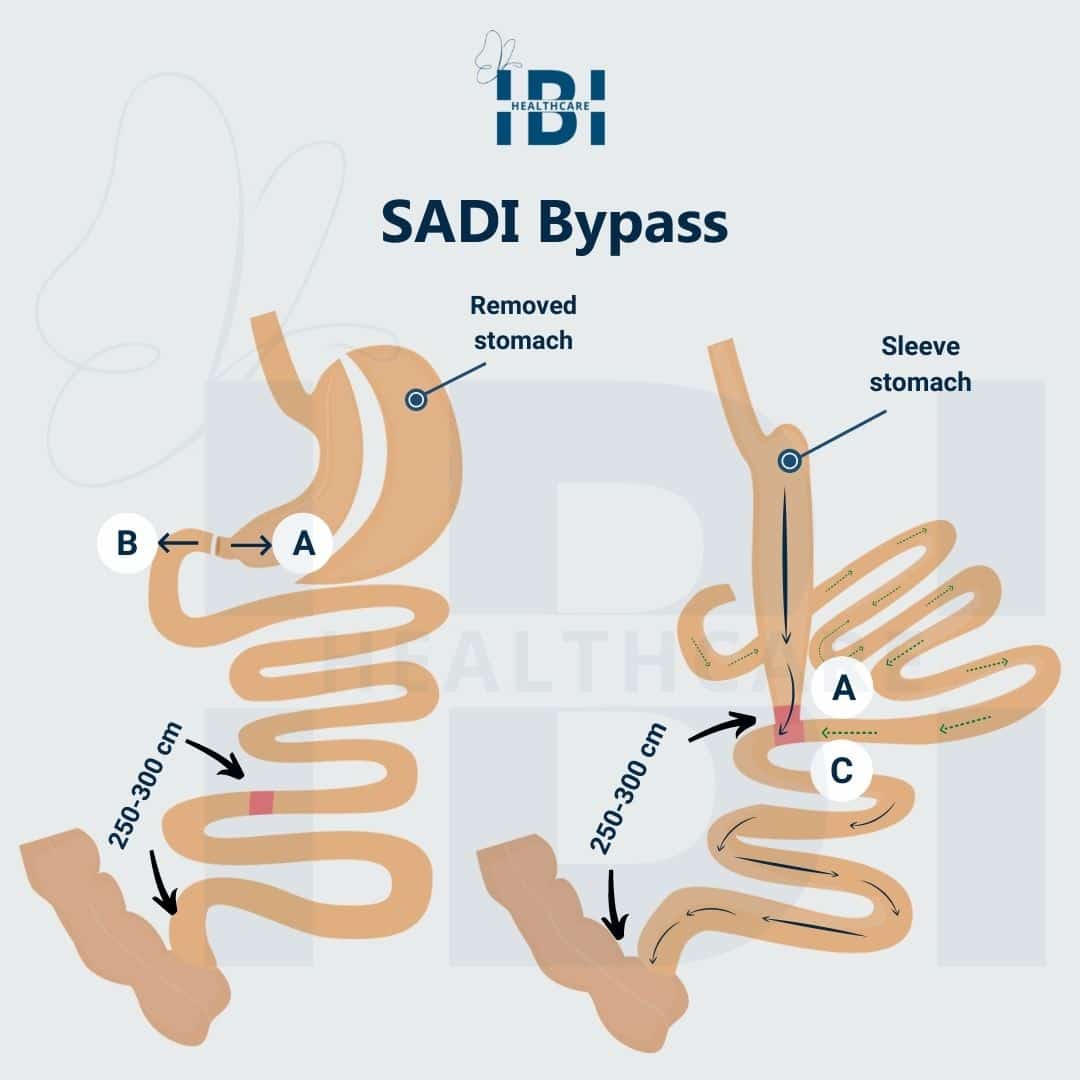Single Anastomosis Duodenal-Ileal Bypass (SADI)
Single Anastomosis Duodenal Ileal Bypass sometimes referred to as SADI Bypass or SADI-S (Single Anastomosis Duodenal Ileal bypass with sleeve). It is an upgraded version of the Duodenal Switch Surgery.
Furthermore, it combines both restrictive and malabsorptive measures, which offers significant weight loss potential.
Moreover, doctors often use it for individuals with higher weight. Because it provides one of the most aggressive weight loss results among Bariatric Surgery options.
However, the American Society for Metabolic and Bariatric Surgery has recently changed SADI. To an approved weight loss surgery from its previous category of investigational. Additionally, this procedure involves a combination of Gastric Sleeve with an aggressive Gastric Bypass of the small intestine. Unlike the duodenal switch, which consists of two intestinal bypass routes. SADI surgery only contains one which reduces the time in surgery as well as risks.
How Does SADI Bypass Work?
Subsequently, doctors can combine SADI surgery into one surgical procedure or two separate surgeries depending on the patient. Equally important, patients who have extremely heavier body weight often benefit from having the first stage of surgery. And then waiting several months until they have the second stage of the surgery. Therefore, it allows the patient time to lose a substantial amount of weight between surgeries which lowers risk factors.

- The first stage of the surgery is gastric sleeve surgery which significantly reduces the size of the stomach.
- Consequently, using a laparoscopy the surgeon accesses the stomach via several small abdominal incisions.
- However, removes about 80-85% of the lower portion of the stomach leaving it resembling a small banana.
- Lastly, the smaller stomach will help the patient with portion control going forward.
- Besides this, it also reduces the production of the hormone ghrelin which sends hunger signals to the body.
The second stage of the surgery takes a portion of our small intestine. Re-routes it to bypass about 3/4 of the digestive system. Significantly, it restricts the number of calories that the body can absorb from any food ingested. Afterward, this also restricts the absorption of vitamins and nutrients. That the body critically needs to remain healthy and function so daily supplements will be critical after SADI surgery.
Why Consider Single Anastomosis Duodenal-Ileal Bypass?
- Uses only one bypass.
- Reduced risk for complications.
- Reduced risk of dumping syndrome.
- Yields significant weight-loss results.
- Proven to reduce or eliminate type 2 diabetes.
- Alleviates many obesity-related comorbidities.
- You can use it to modify an existing bariatric surgery for additional weight loss or address weight regain.

How Much Weight Can I Lose with SADI?
- The weight loss after SADI surgery tends to be rapid and significant.
- After SADI surgery, patients can lose between 80-90%. In addition, more of their excess weight between a year and eighteen months post-surgery.
- However, the first 3 months immediately after surgery patients will see the most weight loss.
- Lastly, the closest comparison in bariatric procedures would be to a gastric sleeve or gastric bypass. Furthermore, it offers a loss of 65-85% of excess weight.
Who is the Right Candidate for SADI Surgery?
- If you have BMI (Body Mass Index) 50+.
- You are not currently receiving psychiatric medications.
- You have been unsuccessful in losing weight with diet and exercise.
- You are not pregnant, breastfeeding or soon planning a pregnancy.
- You have experienced weight regain after a failed bariatric surgery, such as gastric sleeve.
- You understand the risks of malnutrition and commit to taking supplements for life.
- If you have BMI of 35-49 and also one or more obesity related diseases. Such as type 2 diabetes, high blood pressure, heart disease, sleep and apnea.
Do SADI Surgeries Involve Any Risks?
Firstly, SADI is non-reversible. Secondly, SADI is an excellent surgery for some individuals but is aggressive, so it may not be for everyone. Although, at IBI HealthCare Institute, we offer both surgical and non-surgical weight loss procedures. Any type of surgery involves some risks. With SADI surgery, risks may include:

- Blood Clots.
- Liver Bile Reflux.
- Bowel Obstruction.
- Intestines Perforation.
- Infections or Abscesses.
- Potential Leaks from Staple Sites.
- Potential for Nutritional Deficiencies.
How Long Will the Results Last?
Nevertheless, we expect SADI surgery results to be long-lasting. Eventually, the patient’s adherence to and commitment to a new lifestyle, including diet and exercise, will determine the outcome.
Besides, it is also important that patients who have SADI surgery remain faithful in taking all their additional supplements.
Nonetheless, this will ensure they remain healthy and can maintain their weight loss results. Meanwhile, patients who fully utilize their support systems achieve the best results.
When Will I Start Seeing Results?
Likewise, patients who have SADI surgery see dramatic results in the first 3 months. In addition to rapid weight loss, many patients have experienced remission of obesity-related health issues. For example, type 2 diabetes going into remission, and no longer requires medication.
Regardless, of the amount of weight loss and associated timeline. Ultimately, the patient’s willingness to follow all postoperative dietary restrictions and exercise programs will greatly influence the outcome.
Usually, 12 months after surgery patients have reached or are very close to their target weight.
How Much Does the Procedure Cost?
The Single Anastomosis Duodenal-Ileal Bypass (SADI) procedure is currently available at a reduced rate for a limited time. Benefit from our special offers and seize the opportunity to undergo this procedure at an exclusive price. Consequently, IBI Healthcare Institute offers flexible financing options for qualified patients and self-pay at an all-inclusive price.
To learn more about SADI surgery or find out which weight loss surgery would be best for you. Call us or schedule a teleconsultation. Nevertheless, our medical team will glad to guide you as you navigate through bariatric weight loss.






